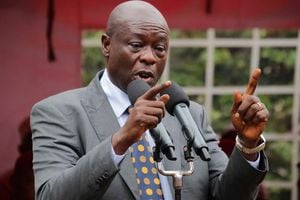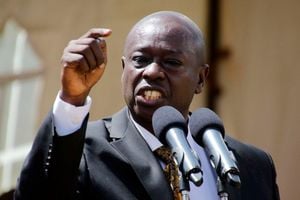
Deputy President Rigathi Gachagua.
National Assembly Speaker Moses Wetang’ula is today expected to notify MPs at the plenary of his receipt of a motion seeking the removal of Deputy President Rigathi Gachagua from office by impeachment.
This comes after three petitioners — former UDA secretary-general Cleophas Malala, Sheria Mtaani and Shadrack Wambui and Ms Caroline Wambui — failed in their attempts to secure court orders blocking the DP’s impeachment.
A fourth petition by Mr Obuli Namenya and five others is yet to be heard by the court.
Mr Malala and Ms Wambui had cited the unconstitutionality of Parliament as the reason why the motion should be dismissed. This is in following former Chief Justice David Maraga’s advisory to retired President Uhuru Kenyatta to dissolve Parliament for failing to enact required legislation as demanded by the Constitution.
Sheria Mtaani and Mr Wambui questioned Speaker Wetang’ula’s impartiality after he appeared to throw his weight behind the motion.
Mr Namenya and five others attacked the constitutionality of the National Assembly’s House Standing Orders, arguing that they were never subjected to public participation.
National Assembly Deputy Leader of Majority Owen Baya (Kilifi North) is the sponsor of the motion and will, therefore, prosecute it on the floor of the House, with Kibwezi West MP Mwengi Mutuse expected to second it.
Gross violation of the Constitution
This will, however, be preceded by guidance from Speaker Wetang’ula in a communication to the House, on how the matter will proceed.
The motion cites DP Gachagua for gross violation of the Constitution, serious reasons to believe that the DP has committed a crime under national law and gross misconduct.
Details from the National Assembly indicate that at least 300 MPs had signed the petition to remove the DP from office by Thursday last week when the motion was presented to the Speaker for approval and onward transmission to the House.
The Constitution states that at least a third of the 349 MPs in the National Assembly, which is 117 are required to sign the impeachment motion for it to be introduced on the floor by the Speaker.
A two-thirds majority of the MPs in Parliament are required to approve the motion.
Yesterday members of the House leadership kept the developments on the motion close to their chest, preferring not to comment on it.
However, Aldai MP Maryanne Keitany, the vice-chairperson of the Trade, Industry and Cooperatives committee confirmed that the motion “is alive before the House today”.
“The motion was presented to the Speaker on Thursday last week and we expect him to officially notify the House today and subsequently give directions on how the motion should be dispensed with,” said Ms Keitany.
According to the House Standing Orders, a motion of this kind is a special motion in nature and takes precedence over any other business scheduled to be transacted by the House for the day.
“When the motion has been passed by two-thirds of all members of the National Assembly, the Speaker shall inform the Speaker of the Senate of that resolution within two days,” Article 145 (2) (a) of the Constitution states.
Kimilili MP Didmus Barasa had claimed to be the sponsor of the motion, which may have not gone down well with a majority of Kenya Kwanza MPs.
“Mr Barasa is rarely in the House. He has never moved a motion on a report of a committee at the plenary. So, how will he prosecute a weighty matter such as the impeachment motion against the DP?” posed a Kenya Kwanza MP from the Mount Kenya region, who did not want to go on record.
This saw a section of the Kenya Kwanza MPs propose that a Parliamentary Group (PG) meeting be scheduled for Monday, September 30, to take a common position on the motion and also the person who will sponsor it. This plan for a meeting was, however, blocked by the coalition’s hierarchy.
Mr Baya was then picked to prosecute the motion on the floor of the House with Mr Mutuse as his seconder.
Standing Order 64 (2) of the National Assembly Standing Orders states that such a motion shall be disposed of by the Speaker in accordance with Standing Order 47 — Notices of Motions — within three days of receipt of notice by a member sponsoring it.
“The motion shall be dispensed with by the House within seven days of a member giving notice and if not, the motion shall be deemed to have been withdrawn and shall not be moved again in the same Session, except with the leave of the Speaker,” the House rules state.
The DP is accused of violating Article 10 of the Constitution on the national values and principles of governance, which binds all State organs, State officers and public officers.
The DP’s “shareholders” comments that advocated for issues of those who only voted for the current regime have been cited as a violation of the national unity call as provided for in the Constitution.
The DP has also argued that counties and constituencies with high populations should benefit more than those with low numbers, adding that “it is human beings who matter, not trees or sand”.
This has been interpreted as against the principle of sharing of the national cake and the devolution of power to the 47 county governments.
He has also been accused of lacking human dignity as he humiliates “other leaders depending on who they relate with”.
The DP is also on the chopping board for violating the collective responsibility of Cabinet. “He chairs the Cabinet Sub-Committee which approves agenda for Cabinet. But in the search for vain populism, he disowns matters that he has presided over, especially when they turn out to be unpopular among the people,” an MP who did not want to go on record said.
His public attacks on state officers, including High Court Judge Esther Maina and Mr Noordin Haji, the Director-General National Intelligence Service (NIS) have been construed as gross misconduct of the stature of the person of the Deputy President.
The impeachment of the DP follows the same route as the impeachment of the President as provided for in Standing Order 64 but with “necessary” modifications.
The House rules state that a member shall deliver to the Clerk a copy of the proposed motion in writing, stating the grounds and particulars in terms of Article 145 (1) of the Constitution upon which the proposed motion is made.
The motion shall be signed by the member sponsoring it and signed in support by at least a third of all the members- which is 117 MPs.
The Standing Orders state that the grounds specified in a motion shall be admissible if framed clearly to particularize and disclose a gross violation of the Constitution or other written law.












